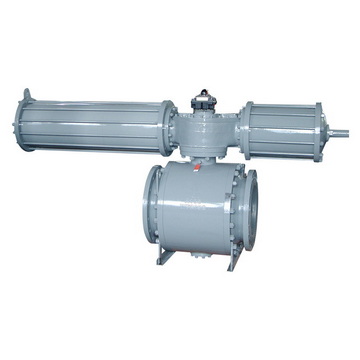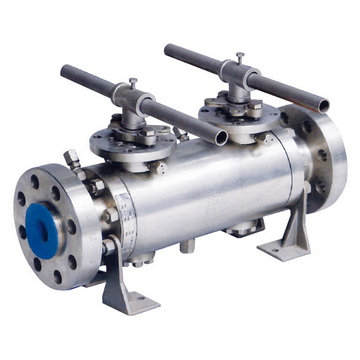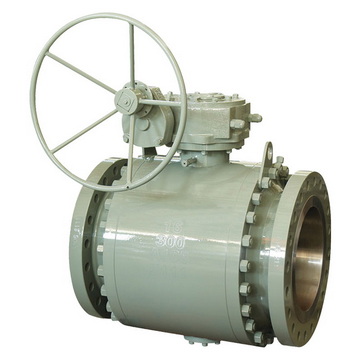Top Carbon Steel Ball Valve Manufacturers and Suppliers in UK
Content Menu
● What Are Carbon Steel Ball Valves?
● Types of Carbon Steel Ball Valves and Their Uses
● Prominent Carbon Steel Ball Valve Manufacturers and Suppliers in the UK
● Key Features and Advantages of Carbon Steel Ball Valves
● Importance of Industry Certifications and Standards
● Applications Across Key Industries
● How to Choose the Right Carbon Steel Ball Valve Supplier
● FAQ
>> 1. What are the primary differences between floating and trunnion-mounted carbon steel ball valves?
>> 2. Why is ISO 5211 mounting important for modern ball valves?
>> 3. Which industries most commonly use carbon steel ball valves in the UK?
>> 4. How does fire-safe certification impact valve selection?
>> 5. Can Chinese manufacturers provide OEM carbon steel ball valves that meet UK standards?
Carbon steel ball valves are essential components in industrial fluid control, especially within demanding sectors such as oil and gas, petrochemical, water treatment, and offshore drilling. These valves are prized for their strength, durability, and ability to provide reliable shut-off solutions under high pressures and severe conditions. As a Chinese factory specializing in designing, developing, and manufacturing high-quality ball valves—including floating, trunnion, and top entry types—we provide tailored OEM services to numerous international brands, wholesalers, and manufacturers worldwide. This article offers an in-depth review of leading carbon steel ball valve manufacturers and suppliers in the United Kingdom, providing insights into the valve designs, certifications, key features, and applications relevant to diverse industries.

What Are Carbon Steel Ball Valves?
Carbon steel ball valves are quarter-turn valves that use a spherical ball to regulate flow through pipelines. The ball, made of stainless steel or other hardened alloys, rotates within the carbon steel valve body to either allow or block fluid flow. The carbon steel material offers excellent mechanical strength, impact resistance, and suitability for high-pressure and moderate-temperature applications, making these valves a staple in industries where durability is required alongside reliable sealing.
The versatility of carbon steel ball valves ranges from small-diameter floating balls that create seal pressure via resilient seats to large, heavy-duty trunnion-mounted balls that provide stability and reduced operating torque in larger pipelines. Additionally, top entry ball valves allow maintenance without removing the valve from the pipeline, reducing downtime and operational complexity.
Types of Carbon Steel Ball Valves and Their Uses
- Floating Ball Valves: These valves feature the ball held in place by seat pressure, making them highly reliable for lower pressure and smaller diameter applications. Their simple design offers economic benefits and ease of maintenance.
- Trunnion (Ear Axis) Ball Valves: Featuring a ball supported by trunnions both at the top and bottom, these valves withstand higher pressures and larger sizes. The trunnion support reduces the torque required to operate the valve, improving actuator compatibility.
- Top Entry Ball Valves: Designed to allow vertical access for inspection and maintenance, top entry valves save significant time and effort in servicing large industrial pipelines, especially in offshore or remote locations.
Prominent Carbon Steel Ball Valve Manufacturers and Suppliers in the UK
The UK boasts a highly developed valve manufacturing and supply chain that caters to the critical oil & gas, chemical, and industrial process markets. Several companies specialize in carbon steel ball valves that meet international standards and offer tailored services.
- All Valves Online: This supplier carries an extensive range of quality carbon steel ball valves from leading global brands. Their products include valves conforming to API and CE requirements, suitable across the upstream to downstream oil and gas sectors. With an emphasis on innovation and after-sales support, they cater extensively to the UK and European markets.
- Ultravalve Ltd: Featuring ISO 9001 certified valves, Ultravalve provides a complete range of carbon steel and stainless steel ball valves, including multi-port and specialty designs for complex process requirements. Their valves support automation options through ISO 5211 mounting conformity.
- Johnson Valves: Known for their fire-safe carbon steel full bore ball valves, Johnson Valves offers sizes from DN15 to DN250, built to withstand pressures up to 50 bar. Fire safety standards, including API 607 compliance, underline their suitability for critical oil and gas applications.
- Flowtech: Offering versatile three-piece ball valves, Flowtech focuses on high-pressure and chemical compatibility valves made from carbon steel, with options for electric and pneumatic actuators.
- Leengate Valves: This supplier delivers flange-mounted carbon steel ball valves with ISO 5211 mounting pads and fire-safe seals, serving petrochemical, offshore, and industrial sectors. Their valves comply with API 607 and TA-LUFT certifications, ensuring safety and environmental compliance.
These UK suppliers emphasize robust quality management systems and strict adherence to internationally accepted certification schemes, ensuring their valves operate safely and reliably across various industries.
Key Features and Advantages of Carbon Steel Ball Valves
Carbon steel ball valves are designed specifically for challenging environments and high-performance needs. The following characteristics distinguish them in the marketplace:
- Robustness and Durability: Carbon steel's tensile strength and hardness enable valves to withstand high pressures, mechanical shocks, and harsh operating conditions.
- Fire-Safe Construction: Many valves include fire-safe designs that prevent leakage if exposed to fire, conforming to fire safety standards critical in hydrocarbon processing plants.
- Full Bore Design: Offering minimal pressure drop and unrestricted flow, full bore ball valves preserve pipeline efficiency and reduce wear on downstream equipment.
- Easy Automation: Standardized ISO 5211 mounting pads allow seamless installation of a variety of actuators—electric, pneumatic, or hydraulic—enabling remote or automated control.
- Wide Range of Application Temperatures and Pressures: Carbon steel valves frequently operate effectively from sub-zero temperatures (-29°C) up to elevated levels approaching 230°C, across pressure ratings such as PN16, PN40, or ANSI Classes 150 to 600.
- Low Maintenance Costs: Designs like the top entry ball valve allow for quick internal access for cleaning, inspection, or part replacement without dismantling from the pipeline.
- OEM Flexibility: Manufacturers provide customization of valve dimensions, pressure ratings, materials, and certification documentation to suit specific customer project needs, supporting OEM partnerships across global markets.

Importance of Industry Certifications and Standards
Compliance with international standards is vital to ensure valve reliability, safety, and acceptance in industrial sectors. Leading UK manufacturers and their suppliers routinely present valves tested and certified to:
- API 6D: American Petroleum Institute specification for pipeline valves, focusing on design, testing, and performance criteria.
- ASME B16.34: Specifies valve design and flanged joint requirements for high-pressure industrial valves.
- ISO 9001: Certification ensuring stringent quality management in manufacturing processes.
- API 607: Fire testing standard ensuring valves maintain integrity under fire conditions.
- CE Marking: Certifies conformity with European health, safety, and environmental protection requirements.
These certifications guarantee that the valves are fit for purpose within hazardous environments, such as offshore oil rigs or chemical plants, where safety and operational continuity are non-negotiable.
Applications Across Key Industries
- Oil and Gas Upstream, Midstream, and Downstream: Carbon steel ball valves operate in drilling rigs, pipelines, separators, refineries, and petrochemical units. These valves handle gases, crude oil, and refined products, where pressure containment and leakage prevention are critical.
- Seawater Desalination Plants: Valves made of carbon steel with proper corrosion-resistant coatings and seat materials regulate seawater and brine flow, supporting vital fresh water production processes.
- Offshore Platforms and Marine Applications: Due to mechanical vibration, corrosive atmosphere, and complex maintenance needs offshore, carbon steel ball valves with fire-safe designs and top entry features are preferred.
- Power Generation: Steam and condensate flows in thermal power plants are often controlled using carbon steel ball valves, which manage high temperature and pressure parameters reliably.
- Chemical and Petrochemical Processing: Resistant to various chemicals and solvents, metal seated carbon steel valves protect critical pipelines and process equipment from leakage and downtime.
How to Choose the Right Carbon Steel Ball Valve Supplier
Selecting a dependable UK supplier or manufacturer depends on multiple factors:
- Product Range and Customization Capability: Ability to provide valves suited to specific application parameters, sizes, and pressure classes.
- Quality Certifications and Testing: Suppliers adhering to recognized standards with documented certifications, including pressure and fire testing.
- After-Sales Service and Support: Availability of spare parts, technical assistance, and post-installation support.
- Delivery Lead Times and Logistics: Efficient order processing and shipment options relevant for large industrial projects.
- OEM Partnerships: Capability to manufacture customized valves per customer design or specification ensures compatibility with client brand requirements.
Given these criteria, buyers will find UK suppliers with broad product portfolios who also import or partner with trusted Chinese factories delivering top-grade OEM carbon steel ball valves, benefiting from competitive pricing and manufacturing expertise.
Conclusion
The carbon steel ball valve market in the UK is robust, featuring manufacturers and suppliers committed to meeting the rigorous demands of oil & gas, petrochemical, offshore, and water treatment industries. These valves provide unmatched strength, fire safety, and operational reliability necessary for critical flow control applications. Complementing this landscape, Chinese OEM manufacturers—including ourselves—offer superior floating, trunnion, and top entry carbon steel ball valves, combining precision engineering and international standards compliance. Together, this global collaboration ensures industry stakeholders in the UK have access to dependable, cost-effective solutions tailored to their stringent operational requirements.

FAQ
1. What are the primary differences between floating and trunnion-mounted carbon steel ball valves?
Floating ball valves rely on two elastomeric seats to support and seal the ball, typically suited for smaller diameters and lower pressures. Trunnion-mounted valves have the ball fixed by trunnion pins at the top and bottom, facilitating use in larger diameters and higher pressure systems by reducing operating torque.
2. Why is ISO 5211 mounting important for modern ball valves?
ISO 5211 standardizes the flange interface between valves and actuators, enabling easy, reliable installation of electric or pneumatic actuators without additional adapters. This streamlines automation integration and maintenance.
3. Which industries most commonly use carbon steel ball valves in the UK?
Key sectors include oil and gas extraction and refining, seawater desalination plants, petrochemical manufacturing, power generation, offshore platforms, and municipal water treatment.
4. How does fire-safe certification impact valve selection?
Fire-safe certification (such as API 607) verifies that a valve can maintain its sealing integrity during and after exposure to fire, preventing hazardous leaks in fire-prone installations crucial for hydrocarbons and chemicals.
5. Can Chinese manufacturers provide OEM carbon steel ball valves that meet UK standards?
Absolutely. Many Chinese factories design and manufacture OEM carbon steel ball valves compliant with API, ASME, ISO, and other critical standards demanded by UK customers, supporting customization and quality assurance.
Hot tags: Top Carbon Steel Ball Valve Manufacturers UK, Best Carbon Steel Valve Suppliers in UK, UK Carbon Steel Valve Companies, Industrial Carbon Steel Ball Valve Manufacturers UK, Carbon Steel Valve Exporters UK, High-Performance Carbon Steel Valves UK, Carbon Steel Ball Valve OEM Suppliers UK, Carbon Steel Valve Distributors UK, Precision Carbon Steel Ball Valve Manufacturers UK, Leading Valve Companies in United Kingdom